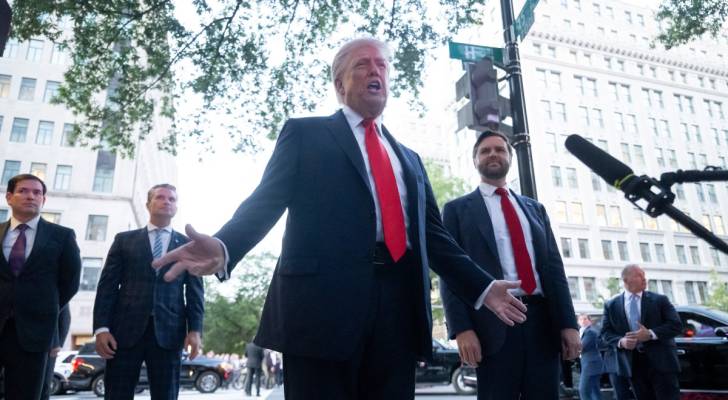US President Donald Trump (Credit: AFP)
Report reveals fury, betrayal at White House after 'Israel's' attack on Qatar
President Donald Trump is grappling with mounting international fallout after 'Israel' carried out an airstrike on Hamas officials in a residential neighborhood of Doha, Qatar, an operation that he insists he had no power to stop.
“I’m not thrilled about the whole situation,” Trump told reporters on Tuesday evening as he headed into a Washington, DC steakhouse. “It’s not a good situation … we are not thrilled about the way that went down.”
The 'Israeli' strike has been described as a direct affront to Washington, since Qatar, a close US ally that hosts the Pentagon’s largest base in the region, was mediating at the request of the White House. By hitting Doha without warning, 'Israeli' Prime Minister Benjamin Netanyahu appeared to sidestep not only Qatar’s sovereignty but also America’s strategic interests.
White House officials were reportedly furious that Netanyahu’s team failed to disclose the plan, even as one of his senior advisers had just met with Trump’s envoy Steve Witkoff, the CNN reported.
“The attacks take place at a very sensitive moment in the ceasefire negotiations,” said former US ambassador to 'Israel' Edward Djerejian. He noted that the Trump administration had been pushing for a “comprehensive ceasefire, the release of all hostages, prisoner exchange and moving forward and ending the war in Gaza.”
Qatar’s leadership condemned the raid as “state terrorism,” while warning that its involvement in mediation could now be reconsidered. The fallout risks undermining not just the ceasefire effort, but also Trump’s broader ambitions in the Middle East, including expanding the Abraham Accords and building closer ties with Gulf states.
The strike also feeds a broader narrative that Netanyahu prioritizes the eradication of Hamas over the safe return of 'Israeli' hostages. Analysts say the attack likely dooms the latest round of negotiations, while ensuring an even bloodier 'Israeli' campaign in Gaza, where tens of thousands of civilians have already been killed.
The White House sought to distance itself from 'Israel’s' actions. “Unilaterally bombing inside Qatar, a sovereign nation and close ally of the United States … does not advance Israel or America’s goals,” press secretary Karoline Leavitt said. Trump himself later wrote on Truth Social that “this was a decision made by Prime Minister Netanyahu, it was not a decision made by me.”
Still, doubts persist about whether Trump truly had no say. The fact that US-made F-35s may have been used in the strike has fueled speculation that Washington was at least tacitly aware of the operation. And questions linger over Trump’s personal ties to Qatar, after he accepted a Boeing 747 jet earlier this year that now serves as his Air Force One replacement.
For Trump, the damage may be less about his standing with voters at home, where his law-and-order agenda dominates headlines, and more about how allies and rivals perceive his leadership abroad. The attack in Doha, carried out under the watch of the US military presence at Al Udeid Air Base, raises doubts about whether America can still guarantee the security of its partners.
In the eyes of many foreign leaders, Tuesday’s events proved once again that Trump has little leverage over Netanyahu. That reality undermines his promise to deliver peace in Gaza and casts fresh doubt over his claim to be the president who can end wars.




